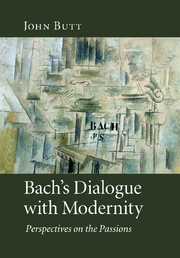Book contents
- Frontmatter
- Contents
- Preface
- List of abbreviations
- Introduction
- 1 Bach's Passions and the construction of early modern subjectivities
- 2 Bach's Passions and the textures of time
- 3 The hermeneutic perspective – negotiating the poles of faith and suspicion
- 4 The voices we hear and the construction of narrative authority
- 5 Between rhetoric and dialectic – Bach's inventive stance
- Afterword
- Appendix
- Bibliography
- Index
5 - Between rhetoric and dialectic – Bach's inventive stance
Published online by Cambridge University Press: 26 February 2010
- Frontmatter
- Contents
- Preface
- List of abbreviations
- Introduction
- 1 Bach's Passions and the construction of early modern subjectivities
- 2 Bach's Passions and the textures of time
- 3 The hermeneutic perspective – negotiating the poles of faith and suspicion
- 4 The voices we hear and the construction of narrative authority
- 5 Between rhetoric and dialectic – Bach's inventive stance
- Afterword
- Appendix
- Bibliography
- Index
Summary
Much of my approach so far has been to investigate ways in which the music of Bach's Passions can make things happen for a potential listener in real time, through the interplay of text, music and performer. I have laid particular stress on the various types of subjectivity that the singers help to constitute, how the music creates the sense of an authoritative narrating subject and how these aspects can be mapped by the listener and can work to exercise his or her own sense of being. The final part of my investigation concerns the way the music is extended as a sequence of sonic ideas that we hear played out in the present of a performance.
The starting point here is the concept of rhetoric, an ancient art that is geared towards grasping the attention of the listener, but which is also at the heart of how the orator/composer finds ideas suitable for spinning out the central topics of an oration, giving it a sense of cohesion and direction. This attitude then spills over into performance, which would normally aim to hold our attention through specific gestures and spontaneous embellishments. In the case of a performer as expert as Bach, it is highly likely that his experience as a performer would have informed many aspects of his compositional activity, however abstract or mechanical some of these might seem.
- Type
- Chapter
- Information
- Bach's Dialogue with ModernityPerspectives on the Passions, pp. 240 - 292Publisher: Cambridge University PressPrint publication year: 2010



